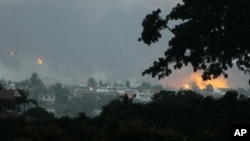U.N. Secretary-General Ban Ki-moon on Monday authorized some 10,000 U.N. peacekeepers, supported by a contingent of French troops, to take the "necessary measures" to stop the use of heavy weapons against civilians in the embattled Ivory Coast city of Abidjan, where post-election violence is escalating.
Fighting intensified Monday, with United Nations forces firing on positions of incumbent president Laurent Gbagbo, while the forces of internationally recognized president Alassane Ouattara pushed toward Mr. Gbagbo's few remaining strongholds.
The U.N. mission in Ivory Coast, known as UNOCI, says helicopters fired on two Gbagbo army camps, the presidential palace and Mr. Gbagbo's residence in the main city of Abidjan. France says its forces took part in the attack at the U.N.'s request.
In a statement, U.N. Secretary-General Ban Ki-moon said that during the past few days, forces loyal to Mr. Gbagbo have intensified and escalated their use of heavy weapons such as mortars, rocket-propelled grenades and heavy machine guns against the civilian population in Abidjan.
Alain Le Roy, Mr. Ban's chief of peacekeeping, briefed the council late Monday on the operation and spoke to reporters.
"They have been attacking the civilian population and also the peacekeepers. Our headquarters has been attacked almost continuously during the last three days by small arms and by heavy weapons also mortars, rocket-propelled grenades. In the headquarters, more than, I think, four peacekeepers have been seriously wounded," he said.
Le Roy said forces loyal to Mr. Gbagbo have also attacked UNOCI patrols that have been dispatched to protect civilians and convoys transporting the wounded in Abidjan, resulting in several more injured peacekeepers. The United Nations has relocated some staff as a safety measure.
In his statement, the Secretary-General said that because of these actions and in accordance with Security Council resolution 1975, which was adopted unanimously last week, he instructed UNOCI to "take the necessary measures to prevent the use of heavy weapons against the civilian population." With the support of the 1,600-strong French Licorne force, a military operation began Monday afternoon in Abidjan.
U.N. peacekeeping chief Le Roy said the operation to neutralize Mr. Gbagbo’s heavy weapons is ongoing, with the French helicopters conducting night missions. Le Roy said he hoped it would be a quick operation, possibly ending by Tuesday.
The Secretary-General emphasized that the U.N. mission is not a party to the conflict, and is acting in self-defense and in accordance with its mandate to protect civilians.
The United Nations certified Alassane Ouattara’s November election victory, but incumbent Laurent Gbagbo has refused to cede power. The U.N. says the post-election violence has killed hundreds and displaced up to a million people.
UN Chief Authorizes Peacekeepers to Deny Use of Gbagbo's Heavy Weapons




